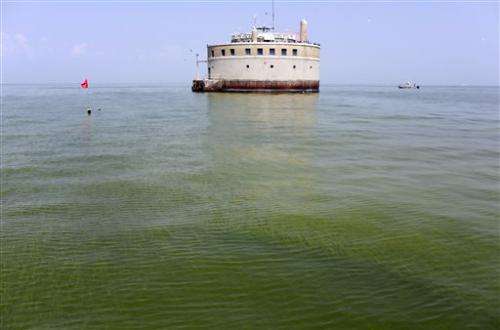Ohio governor signs new rules to help reduce Lake Erie algae

Ohio's efforts to slow the spread of toxic algae in Lake Erie will soon force some farmers to change how they handle livestock manure and require more testing for pollutants at the state's largest wastewater treatment plants.
Legislation signed Thursday by Gov. John Kasich also will create a new state coordinator to oversee the monitoring, treating and testing of algae.
What remains unknown is how farmers and cities will pay for some of the changes that state leaders say are needed to improve water quality and avoid a repeat of last summer when toxins from the algae contaminated the drinking water for more than 400,000 people in northwestern Ohio and southeastern Michigan.
One potential solution to Ohio's funding dilemma is a statewide ballot issue in the early stages of development, according to a state lawmaker looking into the idea.
The plan would be to ask voters to approve a bond issue that could raise millions for Ohio cities with aging wastewater systems that dump tons of raw sewage into rivers during heavy rains and pay for fixes to leaking septic systems.
Farmers—including those in the northwestern corner of Ohio who will no longer be allowed to spread manure on frozen or rain-soaked fields under the new legislation signed Thursday— could share some of the bond money to construct storage for the livestock waste during the winter months.
"This would allow us to start addressing the bigger picture across all of the state," said state Rep. Dave Hall, a Republican from eastern Ohio.
All these issues are contributing to water quality concerns in Lake Erie and the state's rivers and lakes, but federal money to fix them is limited and many cities can't afford the millions it would cost, Hall said.
"These bonded funds would help remove the sticker shock," he said.
Kasich, who has made it a priority to solve the algae problem, said the wide-ranging legislation that regulates manure and seeks to end the dumping of dredged sediment in the lake within five years is only part of the solution.
Fixing septic and wastewater systems are part of it, too, he said just outside Toledo, where he signed the bill into law near the lakefront.
"We're looking at those areas that are the most vulnerable and figuring out if we can help out to some degree," he said. "But the state of Ohio can't buy everyone a septic system."
Farmers might be able to tap into state or federal funds to help them comply with the manure regulations, said Jim Zehringer, the state's natural resources director.
How much it will cost those farmers will vary depending on the size and type of farm as well as whether they decide to store the manure on site, buy new equipment that injects the waste into the ground or pay someone else to get rid of it.
"You can assume it's not going to be small," said Joe Cornely, a spokesman for the Ohio Farm Bureau Federation.
A medium-sized dairy farm with 200 cows might expect to spend around $60,000 for a manure pit with a plastic liner, said Vaughn Brubaker, owner of Manada Construction Co. in Myerstown, Pennsylvania, which installs manure storage systems.
The upfront expense might be eye-popping, but he said farmers will be able to use the manure later on their fields and reduce the amount they spent on chemical fertilizers.
"It isn't as expensive as they think," he said.
© 2015 The Associated Press. All rights reserved.



















